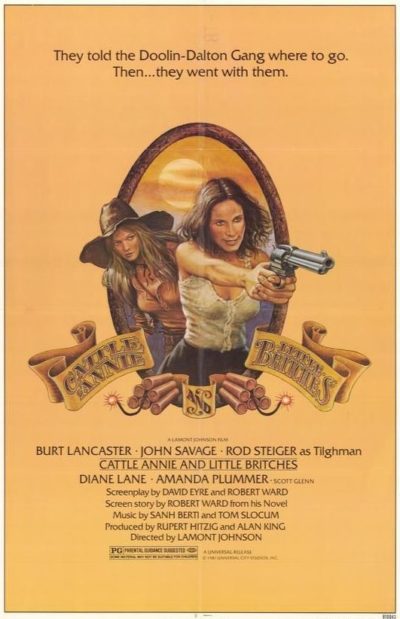★★★
“All legends end in bullshit.”
One of the subjects here almost lived long enough to see her story on the big screen: the woman who was Cattle Annie passed away only three years before the movie version was released in April 1981. Playing her was the daughter of Christopher Plummer, Amanda, in her screen debut (she already had stage experience off-Broadway), while the role of Little Britches went to another near-newcomer who would also go on to fame in her own right, Diane Lane. It was based on Robert Ward’s book – he co-wrote the screen-play – and seems to take a fairly fast and loose approach to the facts of the pair’s lives. Though given the huge uncertainty involved in those, it’s hard to complain too much.
 For example, rather than being born and brought up in Oklahoma, the duo are portrayed as making their way out to California to seek their fortune, when they’re forcibly detoured to Guthrie, OK, There, they encounter Bill Doolin (Lancaster) when he and his gang visit the town. Annie falls for gang member Bittercreek Newcomb (John Savage) and they end up being taken by him to the gang’s hideout. Their knowledge of the Doolin Gang is entirely based on the embellished stories they’ve heard about them, and they’re disappointing to find reality comes up short.
For example, rather than being born and brought up in Oklahoma, the duo are portrayed as making their way out to California to seek their fortune, when they’re forcibly detoured to Guthrie, OK, There, they encounter Bill Doolin (Lancaster) when he and his gang visit the town. Annie falls for gang member Bittercreek Newcomb (John Savage) and they end up being taken by him to the gang’s hideout. Their knowledge of the Doolin Gang is entirely based on the embellished stories they’ve heard about them, and they’re disappointing to find reality comes up short.
The man they encounter, and whose gang they join, is considerably older than the real person. Lancaster was 67 at the time, while Doolin was in his late thirties. The girls are also played significantly older: 23 during filming, Plummer was a full decade older than the real Cattle Annie. The cinematic Doolin seems increasingly weary of the whole outlaw thing, of being pursued by the relentless Bill Tilghman (Steiger), and has little or no interest in living up to his own mythology when he meets the pair. But Cattle Annie’s belief in the legend, at least somewhat reignites the fire. Though after his capture, Doolin returns to fatalism, and it’s up to the girls to stage a rescue mission, when the rest of the gang would just let their leader hang.
You get something of the hardscrabble life about the pair, and how the outlaw life is one of the few routes by which they could escape their grinding poverty. As Annie says after their failed initial attempt to follow Doolin, “I’ll not be a white nigger slave woman! I’d rather burn like a fire!” But there isn’t an enormous amount going on, and the film seems to contain a fair bit of filler, such as an impromptu game of baseball, using equipment looted during a train robbery [As a baseball fan, seems doubtful the entire group of adult men would be so oblivious of the sport as they appear. This was the mid 1890’s: the National League had been running for close to 20 years, with a team in St. Louis, one state over] Though as a meditation on the dying embers of the “Wild West,” and the gap between heroic fiction and slogging through endless rain and mud, it’s effective enough, and you can see why both young leads would go on to greater fame.
Dir: Lamont Johnson
Star: Amanda Plummer, Diane Lane, Burt Lancaster, Rod Steiger




